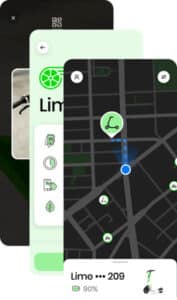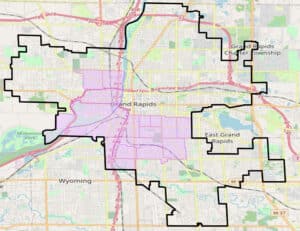
Transportation Equity
Transportation Equity aims to ensure that all community members’ needs
Share:
Share:
Home » August 2023 » The Green Impact
stock.adobe.com / Deyan Georgiev
The COVID-19 pandemic has exacerbated our country’s long-existing systemic racial and economic inequities. In this challenging time, thinking about the future of mobility and the public realm with intentionality through the lens of equity is vital. Neighborhoods of color have unequal access to safe, affordable, and fast transportation options compared to white residents in many cities like Grand Rapids.

Transportation is the second-highest household expense after housing. Limited mobility options impact residents and employees, restricting our communities’ economy and quality of life. Local governments must coordinate and test programs and services that provide citizens with low and no-cost transportation choices.
The City of Grand Rapids Micromobility Program started with a pilot in the fall of 2020 and became a permanent program in the fall of 2022. One private vendor has deployed e-scooters and e-bikes in a 12 square-mile area, including downtown, neighborhoods and business districts. The contract articulates performance targets for fleet mix (e-scooters and e-bikes), equity pricing, and service area.

The City is currently working on a more permanent, expanded partnership with the private vendor on micro-mobility passes. The private vendor’s access program requires participants to apply and provide income verification but once approved, riders receive 50% off ride costs. The current program is not highly subscribed and has mostly been marketed to students.
The City team had previously conceived an opportunity for a low or no-cost pass program to provide standalone passes with 2,700 minutes (three 15-minute rides per day for two months). The passes would have been provided to up to 100 participants in two neighborhoods. However, privacy issues were identified as the City would need to administer the program and perform residency verification. This program would have been staff and resource intensive to the City and the private vendor and would have lasted only two months.
Our team’s thinking shifted to better promote the existing vendor access program through city communications and events to impact more residents. The team is also adjusting the geography of the NOF discount ride promotion to a smaller area to provide additional discounts or entirely free rides. This will allow participants to use the existing discount framework and enrollment from the private vendor and have a more lasting impact on users. Ridership patterns and user feedback can be analyzed to adjust the pass program.
Car sharing increases transportation options for those who are least likely to own a car and is potentially most beneficial to people who are least likely to be able to afford privately-owned vehicles. Car sharing can be defined as services that provide access to a vehicle or fleet of vehicles for short-term use, priced by the hour or minute, located conveniently throughout the community, and with a bundled rate to cover most if not all costs (such as gas, maintenance, and insurance). It provides many of the benefits of a personal vehicle but without the costs of ownership. Car sharing can also increase the availability to individuals and employers for fleet operations that might not be able to afford to purchase and operate EVs.
Mobile GR has selected a consultant and operator to provide carshare feasibility analysis and planning services with the goal of ultimately operating a publicly accessible neighborhood electric carshare program. This car share model has succeeded in small and mid-sized cities, such as Rochester, NY, and Stockton, CA, and will soon launch in St. Louis, MO. The planning phase will evaluate the market and costs for an electric car sharing service that is an affordable mobility option for low-and moderate-income residents, visitors, and businesses and provides a high-quality user experience.
The planning stage is an important first step to prepare for the launch of a service in late 2023. The City has funded an initial budget of $500,000 to cover three years of startup and operations. The initial funding also provides hands-on support for applying for rebates, incentives, and/or grants to support electric vehicle deployments, which will be necessary to build out charging infrastructure and scale and sustain a program. The planning phase includes engagement of regional stakeholders on the interest in and benefits of a neighborhood-based carshare service, identification of potential sites and establishment of multiple program scenarios, including one based in the neighborhoods of focus, and projection and delineation of future costs based on program size, geography, and other variables.
Transportation and mobility must adapt to more rapidly advance improvements to transit, biking, walking, and increased mobility options. Communities across the country are wrestling with challenges in creating a transportation system to better address equity challenges and connect residents and employees to transportation. We all need to live somewhere, and we all need to get somewhere: affordable housing without transportation options leaves much of the affordability problem unresolved. Piloting low and no-cost transportation programs and services are essential to longer-term equitable mobility solutions. ◆
Josh Naramore is the Mobile GR Director for the City of Grand Rapids, MI, and a member of IPMI’s Electric Vehicle Readiness Cohort and Smart Transportation Task Force.

Transportation Equity aims to ensure that all community members’ needs


As we navigate the complexities of the rapidly expanding EV
Parking & Mobility is IPMI’s flagship publication, covering the news, trends, analysis, technologies, and people of the parking and mobility industry, and how it affects and influences communities around the world.
| Cookie | Duration | Description |
|---|---|---|
| cookielawinfo-checkbox-advertisement | 1 year | Set by the GDPR Cookie Consent plugin, this cookie is used to record the user consent for the cookies in the "Advertisement" category . |
| cookielawinfo-checkbox-analytics | 11 months | This cookie is set by GDPR Cookie Consent plugin. The cookie is used to store the user consent for the cookies in the category "Analytics". |
| cookielawinfo-checkbox-functional | 11 months | The cookie is set by GDPR cookie consent to record the user consent for the cookies in the category "Functional". |
| cookielawinfo-checkbox-necessary | 11 months | This cookie is set by GDPR Cookie Consent plugin. The cookies is used to store the user consent for the cookies in the category "Necessary". |
| cookielawinfo-checkbox-others | 11 months | This cookie is set by GDPR Cookie Consent plugin. The cookie is used to store the user consent for the cookies in the category "Other. |
| cookielawinfo-checkbox-performance | 11 months | This cookie is set by GDPR Cookie Consent plugin. The cookie is used to store the user consent for the cookies in the category "Performance". |
| CookieLawInfoConsent | 1 year | Records the default button state of the corresponding category & the status of CCPA. It works only in coordination with the primary cookie. |
| elementor | never | This cookie is used by the website's WordPress theme. It allows the website owner to implement or change the website's content in real-time. |
| viewed_cookie_policy | 11 months | The cookie is set by the GDPR Cookie Consent plugin and is used to store whether or not user has consented to the use of cookies. It does not store any personal data. |
| Cookie | Duration | Description |
|---|---|---|
| _ga | 2 years | The _ga cookie, installed by Google Analytics, calculates visitor, session and campaign data and also keeps track of site usage for the site's analytics report. The cookie stores information anonymously and assigns a randomly generated number to recognize unique visitors. |
| _ga_02PMHW8YWC | 2 years | This cookie is installed by Google Analytics. |
| _ga_LC0QJJHM3J | 2 years | This cookie is installed by Google Analytics. |
| _ga_V9KYTSBYT2 | 2 years | This cookie is installed by Google Analytics. |
| iutk | 5 months 27 days | This cookie is used by Issuu analytic system to gather information regarding visitor activity on Issuu products. |
| Cookie | Duration | Description |
|---|---|---|
| mc | 1 year 1 month | Quantserve sets the mc cookie to anonymously track user behaviour on the website. |
| Cookie | Duration | Description |
|---|---|---|
| ultp_view_1052 | 1 day | No description |
| ultp_view_1058 | 1 day | No description |
| ultp_view_1060 | 1 day | No description |
| ultp_view_1064 | 1 day | No description |
| ultp_view_1068 | 1 day | No description |
| ultp_view_1070 | 1 day | No description |
| ultp_view_1072 | 1 day | No description |
| ultp_view_1078 | 1 day | No description |
| ultp_view_1082 | 1 day | No description |
| ultp_view_1088 | 1 day | No description |
| ultp_view_1100 | 1 day | No description |
| ultp_view_1103 | 1 day | No description |
| ultp_view_1114 | 1 day | No description |
| ultp_view_1118 | 1 day | No description |
| ultp_view_1122 | 1 day | No description |
| ultp_view_1125 | 1 day | No description |
| ultp_view_1130 | 1 day | No description |
| ultp_view_1132 | 1 day | No description |
| ultp_view_1135 | 1 day | No description |
| ultp_view_1541 | 1 day | No description |
| ultp_view_1554 | 1 day | No description |
| ultp_view_1557 | 1 day | No description |
| ultp_view_1560 | 1 day | No description |
| ultp_view_1563 | 1 day | No description |
| ultp_view_1568 | 1 day | No description |
| ultp_view_1572 | 1 day | No description |
| ultp_view_1576 | 1 day | No description |
| ultp_view_1580 | 1 day | No description |
| ultp_view_2305 | 1 day | No description |
| ultp_view_2321 | 1 day | No description |
| ultp_view_2338 | 1 day | No description |
| ultp_view_2342 | 1 day | No description |
| ultp_view_259 | 1 day | No description |
| ultp_view_270 | 1 day | No description |
| ultp_view_275 | 1 day | No description |
| ultp_view_286 | 1 day | No description |
| ultp_view_3074 | 1 day | No description |
| ultp_view_3115 | 1 day | No description |
| ultp_view_3334 | 1 day | No description |
| ultp_view_3336 | 1 day | No description |
| ultp_view_3338 | 1 day | No description |
| ultp_view_3340 | 1 day | No description |
| ultp_view_3346 | 1 day | No description |
| ultp_view_3354 | 1 day | No description |
| ultp_view_3361 | 1 day | No description |
| ultp_view_3367 | 1 day | No description |
| ultp_view_365 | 1 day | No description |
| ultp_view_367 | 1 day | No description |
| ultp_view_38 | 1 day | No description |
| ultp_view_3846 | 1 day | No description |